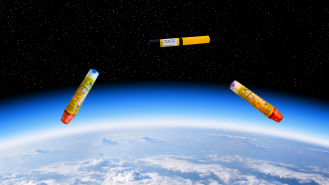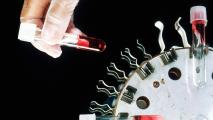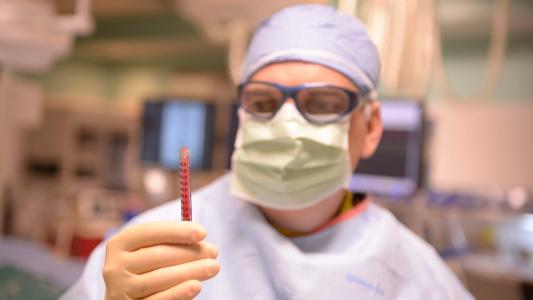A group of Canadian students have discovered that cosmic radiation can break down epinephrine and the solution inside of EpiPens, turning them from life-saving medicine to potentially toxic.
The 9-to-12-year old students, from St. Brother André Elementary School’s Program for Gifted Learners (PGL), teamed up with NASA and researchers at the University of Ottawa to conduct their experiment. Cosmic radiation’s effects on epinephrine and EpiPens was unknown before the students sent their samples into suborbital space.
When their EpiPen and pure epinephrine returned from the near-heavens, the Ottawa researchers found that it had been decomposed by the cosmic radiation; the pure epinephrine remained only 87% pure, with the rest becoming poisonous benzoic acid derivatives.
“The ‘after’ samples showed signs that the epinephrine reacted and decomposed,” Paul Mayer, full professor of Ottawa’s Department of Chemistry and Biomolecular Sciences, said.
“In fact, no epinephrine was found in the ‘after’ EpiPen solution samples.”
A group of Canadian students have discovered that cosmic radiation can break down epinephrine and the solution inside of EpiPens, turning them from life-saving medicine to potentially toxic.
EpiPens and allergies: EpiPens are used to treat potentially lethal allergic reactions, known as anaphylaxis. Delay in the immediate treatment of anaphylaxis with epinephrine is a commonality in severe food allergic reaction deaths, according to the American College of Allergy, Asthma & Immunology. EpiPens are a way to rapidly administer (or self-administer) that life-saving drug.
Epinephrine is a neurotransmitter and hormone that helps key up the body’s “fight or flight reaction” — you may know it by its other name, adrenaline. As a medicine, epinephrine relaxes the muscles in closing airways and tightens blood vessels, and should be administered at the first sign of anaphylaxis.
A toxic environment: The Earth’s magnetic field and thick atmosphere protect us from the brunt of cosmic radiation. But in space, there’s precious little to block these particles.
“These particles, emitted by the Sun and from other energetic sources across the Universe, have the potential to strike complex molecules and break them apart into sub-components,” says Ethan Siegel, theoretical astrophysicist and the author of Starts With A Bang at Big Think.
“This poses a hazard to astronauts that humans on Earth don’t have to face, and testing how life-saving medication fares in the environment of space is an important piece of information to have if we hope to safely transport large numbers of humans beyond the protective shield of Earth.”
The students are now working on designs for protective capsules that could keep the EpiPen solution safe in space.
The student’s experiment was part of NASA’s Cubes in Space program, which provides select student experiments with “plastic payload cubes” that are then taken into suborbital space via rocket and/or high-altitude balloon. (The students sent samples up via both methods.)
Cosmic radiation’s impact on epinephrine calls into question the efficacy of EpiPens for an astronaut’s allergic reaction, Mayer said. The students are now working on designs for protective capsules that could keep the EpiPen solution safe in space.
We’d love to hear from you! If you have a comment about this article or if you have a tip for a future Freethink story, please email us at tips@freethink.com.






